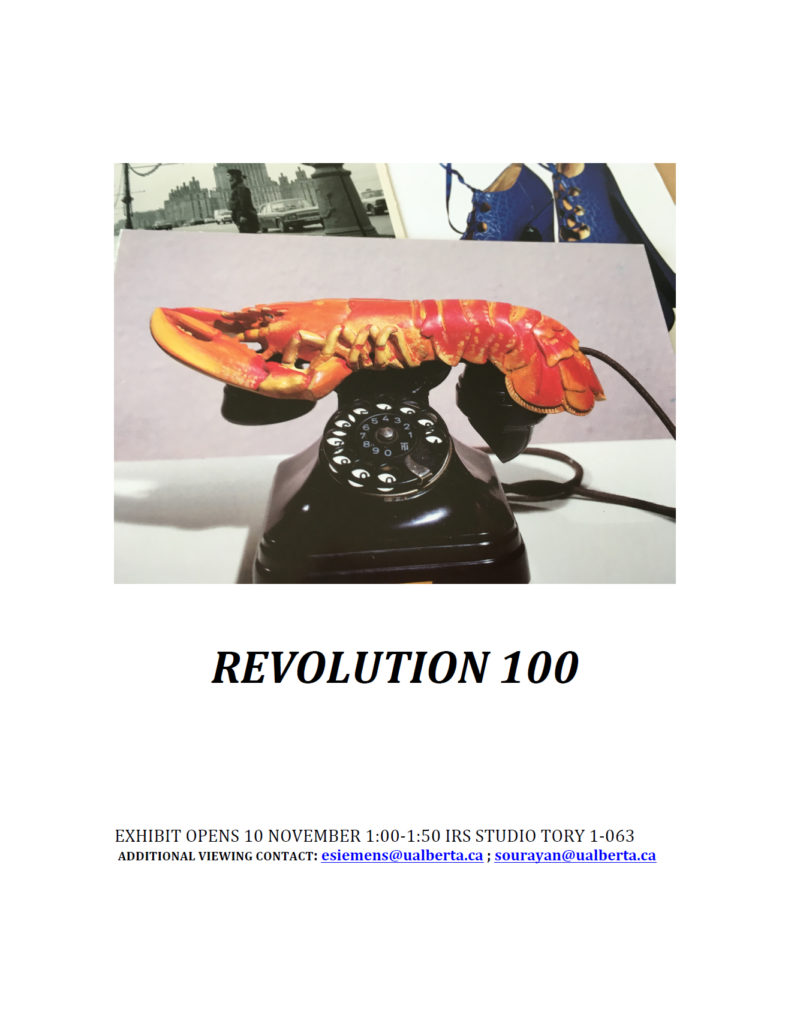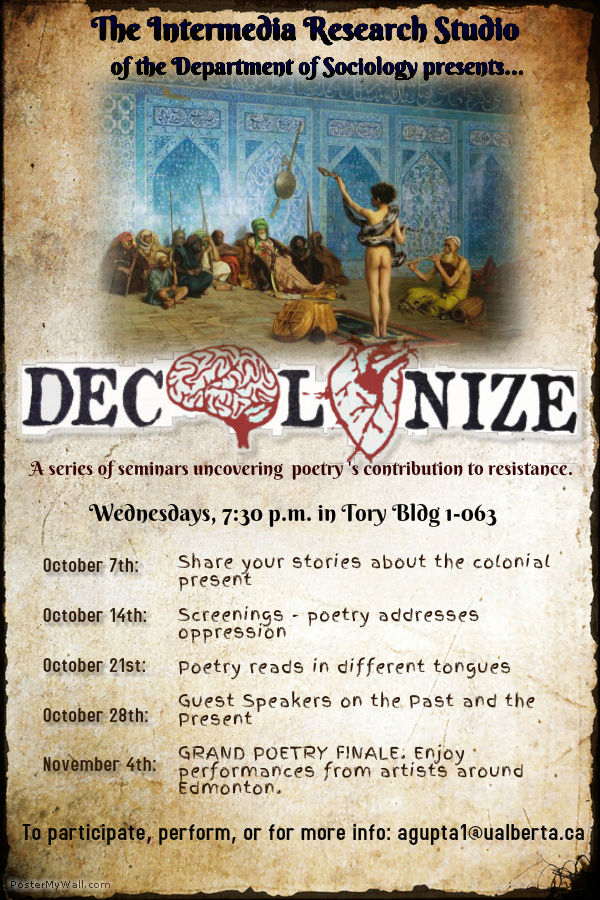
Category: Events
Events: exhibits, lectures, seminars, screenings, roundtables, colloquia, situations
Toxic Media Ecologies – Symposium – March 12, 2016
CALL FOR PAPERS
TOXIC MEDIA ECOLOGIES:
CRITICAL RESPONSES TO THE CULTURAL POLITICS OF PLANETARY CRISES
Abstracts Due: December 11, 2015 (awinkler@ualberta.ca)
This symposium and research creation exhibition builds on last year’s Intermedia Research Studio Symposium entitled “Making Research: Materiality, Creativity, and Intermediation.” The aim continues to be to connect researchers with diverse disciplinary backgrounds and nourish the building of an academic community that is interested in sharing ideas and collaboration.
Toxic Media Ecologies: Critical Responses to the Cultural Politics of Planetary Crises
A media ecology approach interrogates the immanence or saturation of media in all of its varieties in our social and historical being. The study of media ecologies examines not only the ways we communicate but also our history, our resistances and revolutions, our institutions and environments, our injustices and our violences, our inventions and discoveries, our bodies and our culture insofar as these all communicate us to ourselves over time and space. Media ecology encompasses the complexity of media environments as it considers its structures, interactions, transformations, and its grammar. Marshall McLuhan’s famous aphorism “the message of a medium is other media” captures precisely the dialectic of fragment and totality, of the specificity of situations and the abstraction of the system that the theory of media ecology seeks to register: Our social being is always mediated by meaning. Meaning is always technologically mediated. All technology never stops obeying the laws of nature. All technology never stops obeying the call of meaning. All technology is created by social production. All social production is also meaning production, is technologically mediated, is ultimately social reproduction, and as such never transcends the planetary web of life. The social reproduction of the commons is this political movement of intermediation in the void. The study of media ecologies tries to detect such absolute movements of becoming.
Our title, Toxic Media Ecologies, signals an interest in critical inquiry that investigates ways power intoxicates the intermedia environments we find ourselves in at this conjuncture of converging planetary crises. We have now long seemed to live in an age where crises are normal and normalizing. Economic, political, cultural, social, personal crises today increasingly collapse together into situations of toxic shock that intensifies repression and processes lives into toxic waste. We are thus led to ask: How do intersecting systems of oppression fabricate spectacular crises while rendering invisible enduring and intensifying ones? How do they silence dissent, disarm critique, data-mine dreams, alienate solidarities, and disarticulate self-organizing common autonomies? What monstrous diseases and new pandemics, what decolonized organs of perception and intellection, what mutations of repression and resistance, what new phantom limbs of paraplegic convulsion and revolutionary praxis grow throughout our body politic as they are enclosed by the toxic shock of our contemporary intermedia environments?
We invite paper and research creation proposals that address any of the questions above and below:
• How do images and ideas about crises circulate and to what end? What roles do different media play in this process and how do they interact? How do such intermedia environments limit and provoke political responses to any given crisis in question?
• What intermedia relays enable the fabrication of spectacular crises and their representation? How can research creation strategies critically intervene?
• How are yet other crises in the lives and locations of marginality rendered invisible?
• What can we critically discern regarding the politics of representation through which
crises of migration, to take on example, come to be framed for different publics?
• Through what intermedia environments are wars today provoked, prosecuted, gamed,
financed, or aestheticized?
• What intermedia relays connect different crises to each other? How can public
sociology / research creation create critical vocabularies for such omni-crises?
• What possibilities do public sociology / research creation hold for social justice
responses to planetary crises?
We invite papers and projects that address any specific crisis or any kind of crisis: environmental crises – political-economic crises – cultural crisis and moral panics – financial crises – urban crises – food crises – energy crises – water crises – refugee crises – security crises – identity crises – expressive crises – body crises – representational crises
We invite interventions from a wide range of disciplinary and theoretical frameworks, including especially:
Cultural Studies – Research Creation – Arts-based research – Public Sociology – Participatory Action Research – Social Practice Art – Visual Sociology – Decolonizing Theory – New Media Studies – Critical Race Studies – Feminist Studies – LGBT Theory – Queer Theory – Disability Studies – Postcolonial Theory – Urban Studies – Globalization Studies – Critique of Political Economy – Political Ecology – Critical University Studies
Symposium Conveners
Dr. Sourayan Mookerjea, Director, Intermedia Research Studio, Department of Sociology, University of Alberta
Dr. Anne Winkler, Research Fellow, Intermedia Research Studio, University of Alberta
Important Dates
December 11, 2015
Submit title and abstract (Abstract length: Not exceeding 100 words) to Anne Winkler: awinkler@ualberta.ca.
March 1, 2016
Submit complete draft paper [Length not exceeding 3.000 words (12 pages; 1 inch margins; 12 point font; Times New Roman; Double-spaced)]
March 6, 2016
Papers will be circulated among participants.
March 12, 2016
Symposium (& Research Creation Exhibition), Intermedia Research Studio, Department of Sociology, University of Alberta
Decolonize! Poetry & Decolonization Seminar
On Wednesday evenings in October of 2015, the Intermedia Research Studio hosted a series of workshops exploring the relationship between poetry and oppression; poetry has come to play an important role in the postcolonial narratives of colonial subjects.
“Postcolonial writers have had to invent mythologies of their own, stories and allegories of “self” and “other” that can translate this complex heritage and perhaps make a difference by helping to transform the mentality of the oppressed as well as their self-perception.” – Francois Lionnet, Postcolonial Representations: Women, Literature, Identity
The intention behind the workshops was to unpack the intricate relationship between poetry and oppression. There are several examples of poetry movements emerging from political struggles. Postcolonial peoples will oftentimes lack access to academic domains or to dominant media outlets, along with the means for representation of their perspectives to be voiced within those spheres; poetry and other art forms provide possible avenues for these silenced perspectives to form and permeate the culture.
The series began with a session of storytelling. Borrowing from elements of Aboriginal and African traditions, we intended to free ourselves from the prototypically hierarchical European forms of knowledge transmission that are embedded in our culture. Using verbal language to transmit knowledge requires active participation by all members and instead of consuming knowledge imparted by a seemingly superior and ultimate source (e.g. textbook, professor), it allows for more contributive learning.
Storytelling was followed by a screening of poems that have emerged from different political struggles within North America. Some of the prominent examples of poetic struggles include: the Black Lives Matter movement in the United States which addresses the growing evidence of racial bias in police practices; the Palestinian Solidarity Network’s differential representation of the incidents in Palestine, Gaza, and the West Bank versus the ones portrayed by their (North American) government; the Sikh Solidarity Network in Toronto which exposes the media blackout regarding various atrocities committed by the Indian government. This workshop was succeeded by poetry readings in other languages which included performances in Punjabi, Bulgarian, and French. Languages have been an important point of attack in colonization, and the downsize in its diversity has wiped out not only the forms of communication of a people but also the ideas that can only be transmitted through those languages, and therefore the significance of their culture.
The fourth workshop featured guest speaker Dr. Raj Pannu, former leader of the Alberta NDP and a professor at the U of A. This experience-rich discussion titled “the past and the present” centred on understanding how the technological revolution has contributed to or detracted from the political revolution. On the one hand, there is a heightened emergence of undeniable video graphic proof of acts of blatant violence (i.e. police brutality in the US, Palestinian ruins, Syrian refugees). On the other hand, we struggle to actualize the results of these movements. Does the satisfaction of displaying outrage through a Facebook post compromise our efforts in real life? What does it mean for the content we consume when artists have the ability to eliminate the middle man and distribute their product directly to their audience?
Lastly, the whole series was brought to a conclusion by local focus: a grand finale featuring Edmonton poets who spoke about struggles relevant to themselves, their people, and giving all those present something which they may be able to take home and act upon from this workshop on decolonization.
Some readings recommended by seminar participants:
1) The Many-Headed Hydra by Peter Linebaugh and Marcus Rediker 2) From the Ruins of Empire by Pankaj Mishra
3) The Black Hole of Empire by Partha Chatterjee
4) Britain’s Empire by Richard Gott
5) The Racial Contract by Charles Mills
6) Prison Notebooks by Gramsci
7) Walking with the Comrades by Arundhati Roy





